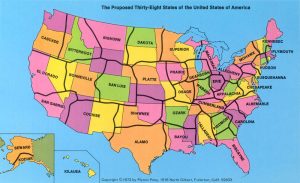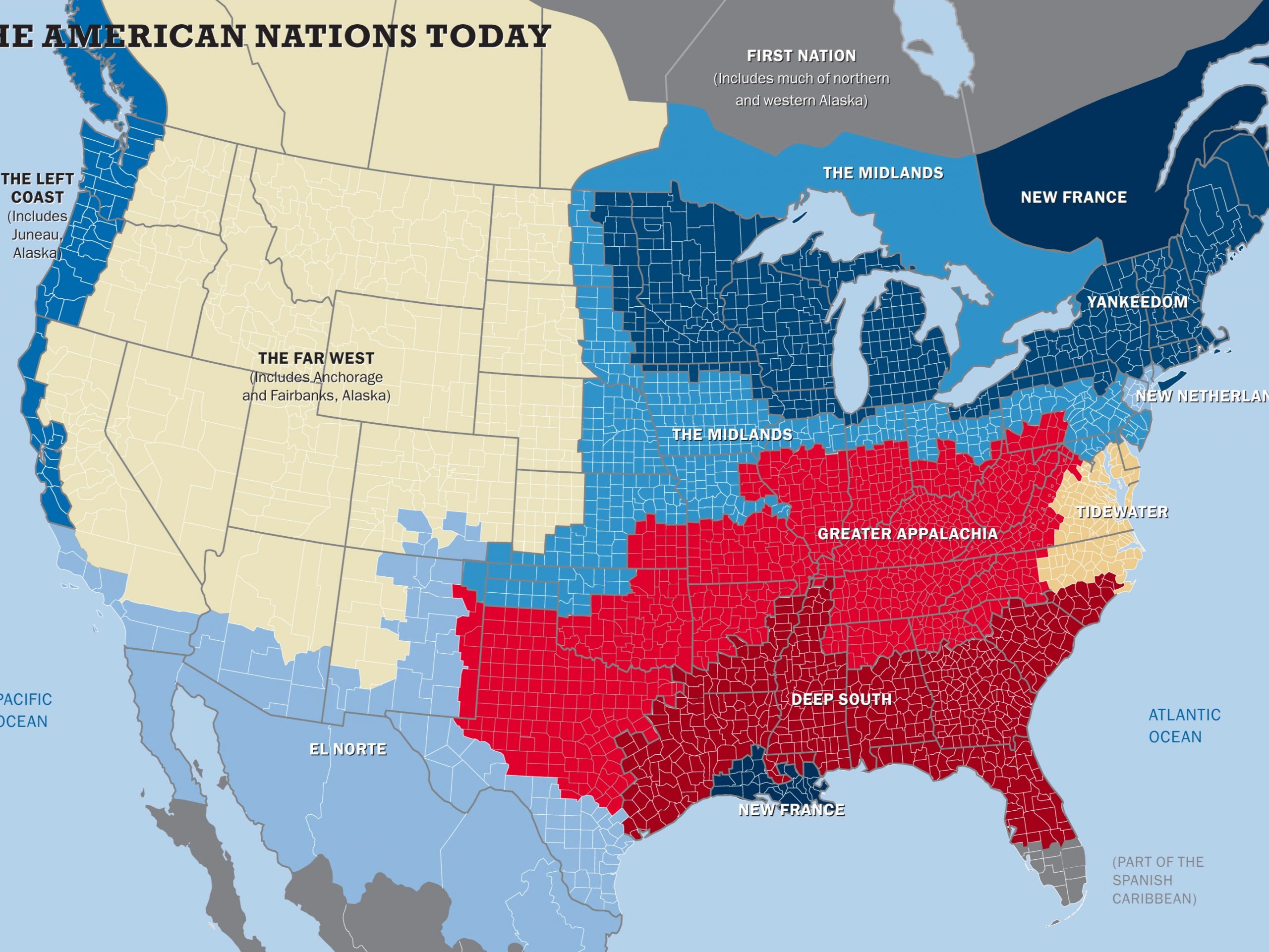In my previous post, on nations, I argued that race (skin color) alone is not sufficient to define a nation of people. Certainly, it is an important component, but few would argue that Frenchman are the same people as Swedes, though both are White. The article also delved into the peculiarities of the American situation, where various people groups came together, and those sharp edges of heritage became blurred, though not really disappearing altogether. Still, while an Irishman and an Englishman might be quite distinct in Britain, once their families migrate to the United States, and especially after a significant amount of time has passed, that distinction is not quite so sharp. In fact, most “Americans” can probably trace their family lines back to multiple nations in the fairly recent past. My own heritage, though primarily British (including English, Irish, Scottish, and Welsh), also includes a significant German component. So what does that make me? I am mostly English, but that line makes up less than half of my heritage. It is a plurality, but not a majority of my blood.
 I think this is the same circumstance that most of us on these shores find ourselves in. As several commenters pointed on in that earlier discussion, in the United States, those specific nationalities of heritage lose some of their meaning (though we still hearken back to them in important ways), and we come to identify as something else altogether, and again, race plays an important role in that. Here, we find Germans, Irish, Finns, and Poles coming together, intermarrying, and melding into a new identity. This distinctly American identity is what I want to address here, along with some of the ramifications of the situation.
I think this is the same circumstance that most of us on these shores find ourselves in. As several commenters pointed on in that earlier discussion, in the United States, those specific nationalities of heritage lose some of their meaning (though we still hearken back to them in important ways), and we come to identify as something else altogether, and again, race plays an important role in that. Here, we find Germans, Irish, Finns, and Poles coming together, intermarrying, and melding into a new identity. This distinctly American identity is what I want to address here, along with some of the ramifications of the situation.
For the past 200+ years, this melding together has taken place, and it has occurred all over the country. Whether you travel to New England, Dixie, the Midwest, or the West Coast, you will find groups composed of a multitude of historic heritages. They have blended into one; however, while the blending happens across the breadth of the country, that does not mean they are all becoming one unique nation, which might be termed “American.” Certainly, that term gets thrown around, and from a legal perspective, it has some merit, but if we are speaking about a nation of people, it is nonsensical.
No, we have a multitude of nations that inhabit the borders of the United States. Until the 20th Century, and even well into it, the primary divide was regional, especially between North and South. Few would disagree that Yankees and Southrons were very different from one another. They had different cultures, experiences, goals in life, and more. This divide between the regions still exists, and now includes several other groups: Midwesterners, Mountaineers, West Coasters, and others. One recent writers declares that at least eleven different nations make up our population, and his breakdown is regional. There is still, by necessity, a strong regional element to nations. That is why Englishmen are from England and Germans are from Germany. Nations are composed of people from a specific region, with a shared history, worldview, and ethnicity. The author of the linked article really doesn’t even consider race, at least in any detail, and if we include that element, we would have many, many more nations; I would argue that we should do that.
 Compounding the issue, however, is a more modern problem: urbanization. We have discussed this before on this site. City dwellers have a vastly different worldview that rural folk. Urban people tend to consider rural folks to be hicks and out of touch with the modern world. At the same time, rural folks consider city people to be crazy, and caught up in an unhealthy, frantic lifestyle. Without debating the merits of either side there (though it should be fairly obvious, I prefer the country), people who spend their lives in a city are not experiencing the same things as people who live in the country. As nations are defined by their socio-political foundation, composed of its own autonomy from other groups, its own interests and needs, and some semblance of cohesion with its members, there is a vast disparity between those who live in cities and those who do not. I would argue that these groups are, in fact, not the same nation, regardless of skin color.
Compounding the issue, however, is a more modern problem: urbanization. We have discussed this before on this site. City dwellers have a vastly different worldview that rural folk. Urban people tend to consider rural folks to be hicks and out of touch with the modern world. At the same time, rural folks consider city people to be crazy, and caught up in an unhealthy, frantic lifestyle. Without debating the merits of either side there (though it should be fairly obvious, I prefer the country), people who spend their lives in a city are not experiencing the same things as people who live in the country. As nations are defined by their socio-political foundation, composed of its own autonomy from other groups, its own interests and needs, and some semblance of cohesion with its members, there is a vast disparity between those who live in cities and those who do not. I would argue that these groups are, in fact, not the same nation, regardless of skin color.
So if we factor in region, ethnicity, rural/urban, and other such factors, we find that what we consider “…one nation, under God, indivisible…” is nothing of the sort. We are not one nation. In fact, we are so many different nations, that it would probably be hard to quantify them. We are also not indivisible. That is a pipe dream. A nation is indivisible because it exists by definition. But with a myriad of nations, the United States will eventually break up. If history teaches us anything, it is that.
All of this discussion, to this point, really has not made race (skin color) a major factor. But it does matter, very much. In the Deep South, for example, we do find lots of urban Whites, urban Blacks, rural Whites, urban Whites, plus a whole host of other ethnicities. I personally know a rural Vietnamese guy who speaks with a deep Southern twang. He rides horses, wears boots, and so forth. But he is not from the same nation as me, as we have a different heritage and ethnicity. We do share a region and some interests and needs, but that is not what makes a nation.
So what do we do? First, I am not even going to delve into religion in this article. That is a major factor, and we discuss it quite a bit here, so I will consider the other factors instead. I would argue that no matter what we do, a break up is coming. It can go down easy, or it can go down hard. But go down, it will. My proposal is for peaceful separation, and that will only happen if we approach it in more than one way.
First, those major groups, and we could use the linked article’s suggestion of eleven different regional nations as a starting point, should secede from the United States, and form their own regional governments (we can debate the efficacy of governments later). No more pretending that we are all one people. We must be willing to recognize the fact that living in specific regions has been instrumental in forming distinct nations on this continent. So Secession is on the table, in my book.
Second, we should recognize the urban/rural divide, and allow for individual city states, within those regions. They should be self-ruled and autonomous. So while Texas might reclaim its status as The Republic of Texas, Austin may well want to be shed of the rest of the state (and I am sure the feeling is mutual). The same could happen in Georgia, where Atlanta would separate from the rest of the state. In the Northeast, New York City could be a self-ruled metropolis, no longer shackled to the rest of the state (or region, depending on how regional lines were drawn). We could separate city and country from one another politically, allowing people to live in whichever sort of environment they wanted. No longer would rural concerns get in the way of urban progress, and no longer would urban concerns cause turmoil in rural areas. Each would be free from the other. Separation between these two groups could take place, and the integrity of the region still be upheld.
Third, while regional concerns are important, we do have to consider race. Here, we must allow for segregation. Some regions might impose forced segregation. Others would opt for voluntary segregation. Still others may choose to continue with forced integration. Each region (or city/state) could determine this for itself. Those who choose to live in that particular location would abide by those rules. If you don’t like it, then move to a place that is more to your liking. Contrary to many people’s understanding (and certainly in opposition to what is usually taught in public schools), this has been going on in the South since slavery ended. Even in our modern world that forces integration, we find that people associate with their own kind. Blacks with Blacks, and Whites with Whites. Now, in some regions, people may choose to look favorably on miscegenation, while others will frown on it, or even forbid it. Again, if you are not happy with your region, you can move.
If these three steps were seriously considered: Secession from the United Sates along regional lines, Separation along the urban/rural divide, and Segregation along racial lines, we might find that we could learn to live peaceably in the same general region.
One things is for sure, as our friend Vox Day has said repeatedly, “Diversity + Proximity = War.” The thing we need to do is find a way to defuse the situation, and I think this is a good starting point for the conversation.
I look forward to your thoughts.










5
Great article, Theophrastus. One thing is certain: no civilization has stood the test of time without upheaval, not even ones with homogenous culture. The demise is not a question of if but when.
Federal “representatives” won’t willingly give up power of ruling over the collective masses. See 16th and 17th amendments. Secession will have to originate regionally. Even then, I don’t hold out hope for a peaceful divorce. Oremus pacem para bellum.
I like the idea of city-states seceding from certain regions. I’m not sure urban areas would favor secession, though. They do not generate their own food or raw material. They have some industry and related goods in their regions but most of that is imported these days. Since they don’t have much to offer, what would they have to gain through secession? I expect urban areas would be just as resistant as federal government.
Time is short and demographic trends are not the friend of the traditional, independent Western man. The secession movement needs to start while we still have the numbers to be effective.
Thanks. There is no doubt that there are lots of details (as you mention, such as food/raw materials, etc.) that would have to be worked out. It might be that trade deals could be part of the process. Who knows.
As to what cities might gain from secession…well, I agree with you. I don’t have much use for cities in general. However, THEY think they are on the right track, and that rural areas hold t hem back. So THEY might view it as being saved from having the rural albatross around their neck.
Succession that leaves an opposing force in the middle of your new nation is not going to work . The cultural rot that some cities cities create would still be there festering and they leverage that money as vs wealth creates will still distort the political system.
Also nothing stops a city state from being a direct military threat to the its neighbors . In the end, the culture of those cities will have to be changed by force I think. They are not to use Russian parlance, agreement capable and they cannot be trusted
This makes such succession bloodier than anyone would want but its the nature of things
This is a good observation. At this point, I have not delved into the “how to” on this issue. Hopefully, that will be addressed soon.
A great series of articles.
Thank you.
How will the city state boundaries be decided in a peaceful way? The proposed system looks desirable, but getting to it faces the same old challenges from human nature combined with the accumulated rot of the present system.
As I mentioned above, I have not really gotten into particulars, specifically dealing with how to accomplish all of this. At this point, I am at the “big picture” level. Plans are to address the specifics later.
I’m looking for anything that I can read up on in regards to this subject. Also with how religion is affecting our culture and and also a more thorough dive into the concept of Western culture & American culture. It’s helping me understand some of the conversations we are having in the Alt-West so that I can contribute and also teach my kids better.
I just finished Mohammed and Charlemagne Revisited by Emmet Scott and found the Pirenne’s theory fascinating. I mention it because he discusses the end of the Western Roman empire which I believe is the proto-culture for Western Civilization.
No doubt, religion is a vital component, and I intentionally left it out of this particular post, as I did not want to write a lot more. It was long enough.
As I have posted in other articles here, though, without a doubt Muslims need to go home.
I think that the urban/rural separation would ease a lot of the racial tension. I tend to get along very well with rural blacks and hispanics, but dispise the ghetto-dwellers and Latrina and her subsidized brood.
After that, voluntary segregation would probably work for most of the countryside. Urbanites would either have forced integration (ensuring the entire city is a liberal shithole), voluntary segregation (if the trash stayed in their area), or forced segregation (if violence kept spilling out of the ghettos).
The general experience of the authors on this site agrees with your observation. Rural/Urban is a much bigger deal than people usually think.
Excellent article! However, voluntary separation would require logical and pragmatic thinking from all parties involved. I believe the left has clearly shown they are incapable of either. No matter our wishes, I don’t see it happening without blood flowing.
Thanks, and agreed regarding the Left. Bloodshed is a possibility, but I sure hope it can be avoided, if at all possible.
I expect the US to devolve into semi autonomous regions that are loosely united in the manner the EU was promoted as being (but really wasn’t by design). You can see the beginnings of this already in things like sanctuary cities and pot legalization where the Fed’s have so far proven powerless to stop. Add in our history and firm (though lately ignored) legal basis for federalism and the framework is there. As the US trends toward the inevitable breakup, distinct regions with disparate people, culture and interests will start asserting their freedom to live in the manner they choose and refuse to enforce or comply with DC edicts they find unpalatable. in short, the inherent right of self determination will assert itself through a benign disregard. Unless of course, DC tries to make an example of Texas (to use one example) live and act like New Jersey. In that case all bets are off. I think the feds don’t have the will to do it of the state govts and regional coalitions of the same simply say no to the rules they don’t like. If the Feds go along, they can still pretend to govern the whole and will probably be able to do so in areas like common defense and interstate trade. However, the feds’ social engineering and one size fits all fiscal policies as well as command and control focused economic policies will be treated as an a la carte menu by regional powers. If we are lucky, anyway. Otherwise, the cities will have to die.
The original idea for this article actually was going to address Federalism, and the reasons why the Founding Fathers chose that system, as it did allow for local autonomy in most respects, which could help alleviate much of the problem that we get from a centralized government. I might return to it in a later installment.
4.5
I agree fully with your assertions in this article.
The United States was founded on a constitution modeled after Rome; like Rome, the nation began as a republic.
It grew to encompass a large, diverse land mass, and as it did so, through force, it not only annexed independent peoples, but it also forced the Confederacy and other adjacent areas to remain in the same empire.
This force required a suspension of republican ideals; yet, as the economy grew, and the agrarian land owning class was replaced by a commercial class (again, as in Rome), technological innovation exploded. In order to grow this economy, additional labor was needed.
After a century of such growth, stagnation began; entertainment replaced innovation, and although the occasional burp of technological progress occurred, the emphasis of society was on enjoyment. First, with television, then cable, and now the internet, people have become more concerned with whatever strikes their fancy then with any matters of import.
Meanwhile, groups that have not benefited from these “advancements”- from Blacks, to Hispanics, to Southern/ Confederate Whites- have been increasingly marginalized. As the ruling Yankee commerce class continues to decline in numbers, in order to continue their dominance, they have played these groups off against each other. Most recently, we see this in the vicious attacks on all things Confederate. The Yankee class has decided to destroy the Confederate people, in some hope of distracting every other marginalized group away from their continued dominance.
Any society built on slaves eventually collapses, and all empire come and go; despite these attacks, people such as Confederates, and Native Americans, have not only survived, they have become more and more entrenched in their culture. The dominant class has it’s entertainments, but for those who have no such distractions, emphasis is placed on survival.
Eventually, the US will go the way of Rome. Some may argue that the US has the world’s strongest military; so did Rome until the very end.
When the US goes the way of Rome, it will not be due to conquest, but due to the fact that the Yankee culture has went the way of the Roman citizen, whereas the slaves of the US state have continued to survive as distinct peoples.
Sic Semper Tyrannis.
Daniel Wayne Lewis, National Chairman, Secessionist Party (CSA)
3.5